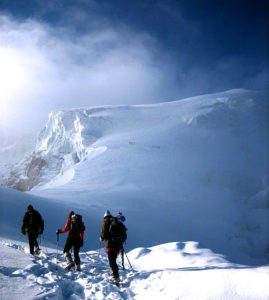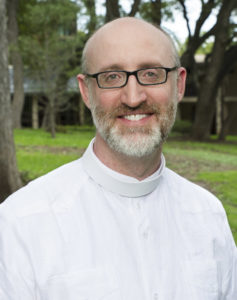
The last time I reread for my children my favorite young-adult novel, Lizard Music, by Daniel Manus Pinkwater, I made a joyful discovery only made possible by the age of the internet. This bizarre and wonderful young-adult novel (which, by the way, I highly recommend) makes several references to artists and writers – most of whom I assumed were purely fictional.
When we got around again to one of the major turning-points in the book, the main character’s “guide,” insists that he knows exactly where they are going because “it is all in Mount Analogue, by René Daumal.” Now, when I read Lizard Music as a child and teenager, I had no internet access (nor did I know it existed or was possible). But now, in our era of “intelligent telephones,” I quickly looked up this title and author on the off chance it was a real book. It is.
The sub-title of René Daumal’s Mount Analogue, is A Tale of Non-Euclidean and Symbolically Authentic Mountaineering. It is the fantastical story of a mountain climber and philosopher who discovers, by force of his own argument, that the mythopoetic mountain, that axis mundi that connects heaven to earth must, necessarily, exist. The author, in the first person, describes the general argument of his academic article on symbolically authentic mountaineering:
The substance of my article was that in the mythic tradition, the Mountain is the connection between Earth and Sky. Its highest summit touches the sphere of eternity, and its base branches out in manifold foothills into the world of mortals. It is the path by which humanity can raise itself to the divine and the divine reveal itself to humanity.
He then delivers examples, beginning with the scriptures:
The patriarchs and prophets of the Old Testament behold the Lord face to face on high places. We have Moses’s Mount Sinai and Mount Nebo, and in the New Testament the Mount of Olives and Golgotha.
He goes on listing Mesopotamian, Egyptian, Greek and finally Hindu examples of the same. By counter example, he describes our primary mythic counter-example of hubristic mountain-building:
Was this not the same effort pursued by the builders of the Tower of Babel, who, without renouncing their varied personal ambitions, expected to reach the One Eternal Being?
Instead of climbing Mount Analogue, the builders of Babel attempted to bridge earth and sky without renouncing their varied personal ambitions. Thus, the author gives the first hint of the terms and conditions under which one may actually ascend mount analogue: renunciation, death-to-self.
His summary of his article then takes another turn before its astounding conclusion. He laments the contemporary loss of symbolically authentic mountains, for even the highest and most remote peaks of the Himalayas are now no longer out of the reach of stout and persistent modern mountaineers (even those with “varied personal ambitions”). This compels him toward his bold conclusion:
For a mountain to play the role of Mount Analogue . . . its summit must be inaccessible, but its base accessible to human beings as nature has made them. It must be unique and it must exist geographically. The gateway to the invisible must be visible.
Those remote mountains that used to provide vistas of Mount Analogue have lost their symbolic authenticity now that they have been conquered by modern mountaineering methodologies. But that one, true summit of Mount Analogue is inaccessible to human beings as nature has made them. Its foothills and branches, nevertheless, continue to break into our everyday human world.
Through a series of meditations and conversations he and his mountaineering companions discern what they must do and the way they must go in order to climb Mount Analog. Because, if you are a mountaineer, you obviously must climb it, for, as they have discerned, it is there. The key to the path is being ready to find it. The key to being ready to find it is, as we have already noted, the renunciation of “varied personal ambitions.”
I don’t have the space in this web log post to go into the ecstasies of Daumal’s choice of name for the mountain (Analogue), to contemplate mountaineering as a metaphor for the relationship of modernity to mythology, to extol the leap from how a mountain may be symbolically authentic to the assertion that one necessarily exists, nor to expound the narrative any further (I fear I may have included too many “spoilers,” already). So, I conclude:
The summit of Mount Analogue is not entirely inaccessible, it is only inaccessible as nature has made us. Or, perhaps, in the condition we find ourselves after the Fall. So, for us, as Christians, when God transfigures and remakes us his New Creation, we find we have ascended Mount Analogue. When we renounce ego, when we die to self and live to Christ, we find that although we started our journey on the quotidian foothills and branches of the geography of our varied personal ambitions, we have, nevertheless, by grace, found ourselves arrived at that one thing needful. “The gateway to the invisible must be visible.” “And we have beheld his glory, the glory as of a Father’s only Son, full of grace and truth” (John 1:14).
Are you ready to do what it takes to find and climb Mount Analogue?
What is getting in the way?
What are you waiting for?
 The Rev. Nathan G. Jennings
The Rev. Nathan G. Jennings
J. Milton Richardson Associate Professor of Liturgics and Anglican Studies and Director of Community Worship
A native of Austin, Professor Jennings returned to his hometown when he joined the faculty of Seminary of the Southwest in 2005. Jennings has also served as the Director of the Anglican Studies Program at Seminary of the Southwest since 2008. Jennings is interested in liturgical theology, dogmatic theology, ascetical theology, theological hermeneutics and the way these disciplines intersect and inform one another. His book, Theology as Ascetic Act: Disciplining Christian Discourse, published in 2010, represents a light revision of his doctoral dissertation and argues that Christian teaching and reflection are embodied acts analogous to, and part of, Christian asceticism. Jennings has published various book reviews and articles in journals and collections. He is currently working on a book that will provide a liturgical theology of sacred text and its interpretation. In teaching, Jennings reflects on liturgy theologically as that which enables participation in God and God’s work in the world. In addition to the required liturgy and Anglican studies courses, Jennings offers elective seminars in Liturgical and Sacramental Theology, Liturgical Hermeneutics, and occasional seminars on Anglican Divines and Church Fathers.
BA, University of Texas
MDiv, Yale Divinity School
MA and PhD, University of Virginia

